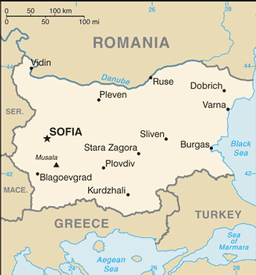Bulgaria
 Bulgaria is country of Europe located in east Europe.
Bulgaria is country of Europe located in east Europe.
Details
| Official Name: | Republic of Bulgaria |
| Capital: | Sofia |
| Total area: | 110 994 km2 |
| GDP per capita: | $14,312 |
| Native Language: | Bulgarian |
| Government: | Unitary parliamentary republic |
| Population: | 7,364,570 |
| Major Religion: | Bulgarian Orthodox Church |
| Monetary Unit: | Lev (BGN) |
Bulgaria, officially the Republic of Bulgaria, is a country located in Southeastern Europe. It is bordered by Romania to the north, Serbia and Macedonia to the west, Greece and Turkey to the south, and the Black Sea to the east. With a territory of 110,994 square kilometres (42,855 sq mi), Bulgaria is Europe's 14th-largest country. Its location has made it a historical crossroad for various civilisations and as such it is the home of some of the earliest metalworking, religious, and other cultural artifacts in the world.
Located in the heart of the Balkans, Bulgaria offers a highly diverse landscape: the north is dominated by the vast lowlands of the Danube and the south by the highlands and elevated plains. In the east, the Black Sea coast attracts tourists all year round.
Founded in 681, Bulgaria is one of the oldest states in Europe. Its history is marked by its location near Europe’s frontier with Asia. Some 85% of the population are Orthodox Christians and 13% Muslims. Around 10% of the population are of Turkish origin while 3% are Roma. Similarly, its traditional dishes are a mixture of east and west. The most famous Bulgarian food must be yoghurt, with its reputed gift of longevity for those who consume it regularly.
The Bulgarian National Assembly (a single chamber parliament) consists of 240 members who are elected for a four-year period.
Bulgaria’s main exports are light industrial products, foods and wines, which are successfully competing on European markets.
Fans of folk music will be familiar with a number of Bulgarian musicians. A Bulgarian folk song was included on the Voyager Golden Record which was sent into outer space by NASA. Famous Bulgarians include philosopher Julia Kristeva, Elias Canetti, Nobel Prize winner for literature in 1981, and Christo Javachev (“Christo”), the creator of many unorthodox outdoor sculptures.
Economy
Bulgaria has an emerging market economy in the upper middle income range, where the private sector accounts for more than 80 per cent of GDP. From a largely agricultural country with a predominantly rural population in 1948, by the 1980s Bulgaria had transformed into an industrial economy with scientific and technological research at the top of its budgetary expenditure priorities. The loss of COMECON markets in 1990 and the subsequent shock therapy
of the planned system caused a steep decline in industrial and agricultural production, ultimately followed by an economic collapse in 1997. The economy largely recovered during a period of rapid growth several years later, but individual mean income remains one of the lowest in the EU at 768 leva (393 euro) per month. More than a fifth of the labour force are employed on a minimum wage of 1 euro per hour. Wages, however, account for only half of the total household income, owing to the substantial informal economy which amounts to almost 32% of GDP. Bulgarian PPS GDP per capita stood at 45 per cent of the EU average in 2011 according to Eurostat data, while the cost of living was 49 per cent of the average. The currency is the lev, which is pegged to the euro at a rate of 1.95583 levа for one euro. Bulgaria is not part of the eurozone and has abandoned its plans to adopt the euro.
Immigration and residency
If you are interested in moving to the countries, either with a residence permit or by acquiring a citizenship, please contact us, and also get acquainted with the relevant migration documents.